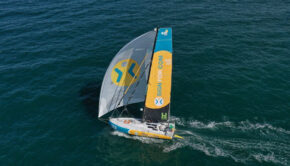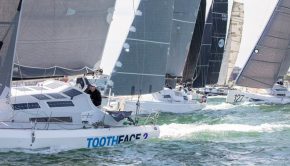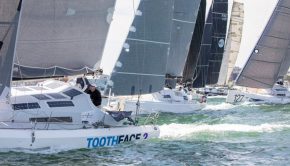JOE HARRIS: The Importance of The Atlantic Cup
Published on April 23rd, 2013
With four transatlantic crossings, nine Newport Bermuda Races, five Marblehead to Halifax Races, five Bermuda One-Twos (including a course record) and several other major races under his belt, Joe Harris has logged more than 60,000 offshore miles and is one of the best shorthanded sailors in the U.S.
A resident of South Hamilton, MA who grew up sailing on Long Island Sound, the affable Harris switched from the Open 50 class to Class40 in 2011 when he purchased an Akilaria RC 2 named Gryphon Solo2. In 2012, Harris and coskipper Tristan Mouligne (Boston, MA) sailed Gryphon Solo2 to a third place finish in The Atlantic Cup presented by 11th Hour Racing.
Harris has set his sights on winning this year’s Atlantic Cup, the first event in a very ambitious campaign leading up to the Global Ocean Race 2014-2015, a 30,000-mile, singlehanded round-the-world race for Class40 yachts that starts in September 2014. WindCheck magazine recently spoke with him about The Atlantic Cup and the growth of Class40 in the U.S.
WindCheck: What are the challenges of double-handed racing at a top level, particularly in terms of getting enough sleep?
Joe Harris: The biggest challenge of double-handed racing is that there are more jobs to do than there are hands to do them. Rather than doing everything at once, you have to slow down a little bit and do things sequentially. Things like jibing take a bit more thought and preparation. If you’re jibing with the kite up on a fully crewed boat with eight or ten guys you yell, ‘Jibe!’ Everyone’s got a job, everything happens and you’re on your way ten seconds later. When you’re double-handed, you’ve really got to think it through and it takes more preparation. You really have to be careful, because you can lose a lot of time from a mistake like wrapping a spinnaker or a crash jibe. I’m a proponent of taking a little more time to get a maneuver done but getting it right.
If you’re reaching along in a moderate breeze, an autopilot will steer as well as a human, or better, particularly if the autopilot is set to an apparent or true wind angle and your instruments are all well calibrated. You trim the sails and the pilot will keep the boat on the correct angle. But in light air, particularly upwind, the boat doesn’t steer as well on autopilot. You really need to drive, and you need to be constantly trimming the sails. If you’re doing that hour after hour, particularly at night, you can get exhausted. If you’re really exhausted, you might fall asleep on your feet or have hallucinations. – Read on
Background: The Atlantic Cup presented by 11th Hour Racing is a dedicated professional Class 40 race held annually in the U.S. The 2013 edition starts with a doublehanded leg on May 11 from Charleston, SC to New York, NY (648 nm), and another doublehanded leg on May 18 from New York to Newport, RI (260 NM). The event concludes on May 25-26 with inshore fully crewed (six people on board) buoy racing in Narragansett Bay.








 We’ll keep your information safe.
We’ll keep your information safe.